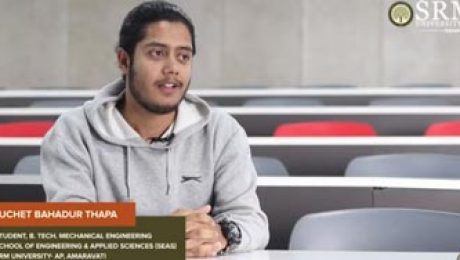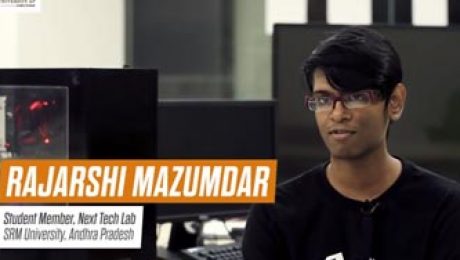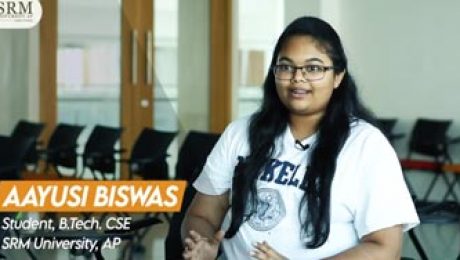Campus Placements 2020-2021
Brilliant students of SRM AP lands up with excellent job offers to initiate the Campus Recruitment Drive

SRM University-AP, Andhra Pradesh has commenced its journey to secure a better future for the first batch of students. Promising students of SRM AP have grabbed excellent job offers in the Campus Recruitment Drive for Class 2021 B.Tech students. The renowned company which conducted the recruitment drive at SRM AP, Amazon, selected Sri Ritika Katragadda and Venkata Sai Nikhith Nagamlla for an internship with a stipend of 45 thousand leading to job offer with a CTC of 29.5 LPA based on performance. In addition, Sai Rishvanth Katragadda, shone in the recruitment drive conducted by PayPal who offered the brilliant student a package of 24 LPA for the position of Software Engineer. PayPal is a reputed company that provides a worldwide online payment system, online money transfers, and serves as an electronic alternative to traditional paper methods. Another renowned company, Anheuser-Busch InBev offered 6 months internship, followed by a job offer to outstanding candidates. The company shortlisted Pesala Sai Tanmayi, Sri Harsha Tavidisetty Rajendra, Tuhin Sarkar, and Koushik M Bhargav. Anheuser -Busch InBev SA/NV, commonly known as AB InBev is a Belgian multinational drink and brewing company. The company has offered an internship stipend of 30 thousand per month and a CTC of 12-17 LPA to the candidates who will join the company after successful completion of their internship.
Moving ahead, Health Rx, a health care startup of Bajaj finserv group, has offered Technical Internship with a stipend of 35 thousand per month, and on successful completion a job offer with CTC of 12 LPA to Talari Hrisheekesh, and Gude Abhin will be released. Also, Alluri Harika received an offer from Optum Global Solutions, a health services and innovation company, with a package of 12 LPA. Further, Aayusi Biswas got placed at Sabre Corporation in the position of an Associate Software Engineer. In this revered company operating in the travel technology sector, Aayushi will be receiving a CTC of 10 LPA. Also, the leading multinational investment bank and financial services company, Barclays, hosted recruitment drive at SRM AP and offered job offers to Bhaskarani Sharath Chandra Kumar, and Mohammad Nilofer Sultana with a package of 10 LPA. Advancing with the recruitment drive, ZS Associates, a professional service providing firm focusing on consulting, software, and technology recruited Vatsal Rathod, and Pushya Mitra K with a CTC of 10 LPA. Alongside, Gaddam Akhileshwar Reddy got placed at Veritas Technologies LLC., an American international data management company with a package of 10 LPA.
Advancing with the placement season, a company named Amadeus selected Gumadavelly Ramya and Sai Krishna Rohith Kattamuri with a CTC of 10 LPA. Amadeus is a travel technology company that provides the critical solutions for airlines and airports, hotels and railways, search engines, travel agencies, tour operators and other travel players to run their operations and improve the travel experience. Similarly, Coviam Technology, an innovative technology start-up, selected G Adarsh, Sai Rishvanth Katragadda, Jashwanth Reddy Dodda, and Jonnalagadda Noyal for an initial internship offer with a stipend of 25 thousand per month, which will be converted to a job offer with a CTC of 7.5 LPA. In addition, Opentext, a Canadian company that develops and sells enterprise information management software, has offered an internship opportunity with a stipend of Rs. 15 thousand, post completion of which, the two students Rampati Venkata Tarun, And Neelakantam Poorna Venkat, will be placed with a CTC of 7.25 LPA.
Progressing with the recruitment drive, several reputed companies such as Walmart Labs, Standard Chartered , L&T Technology Services Ltd, Amdocs, Virtusa Corporation, Legato Health Technologies LLP, Infosys Limited, and Cerner Corporation IT, selected more than 10 students with an annual package up to 7 LPA. As the recruiters shortlist the best young talent who are enthusiastic, devoted to learning and brimming with fresh and creative ideas, SRM AP placement team have thoroughly trained the students both in terms of technical expertise and soft skills. The rigorous training that the students underwent since the beginning of their B. Tech course, coupled with their talent and motivation, has enabled them to succeed in recruitment drive with flying colours. SRM AP believes that this is merely the beginning of the placement season, and many more brilliant students are waiting to showcase their mettle to land up with excellent job offers in top-notch companies.
- Published in News
SRM AP organized webinar on “EFFECTIVE WAYS OF WRITING RESEARCH ARTICLE”
Prof Shobhana Narasimhan on “How to publish without perishing”
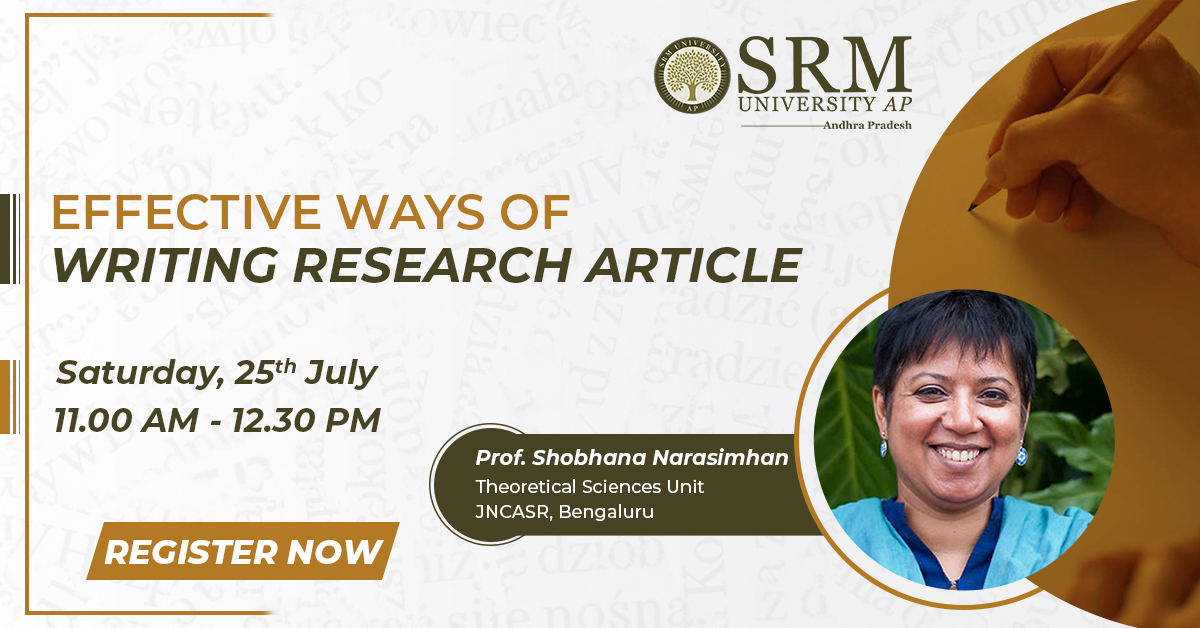 SRM University-AP, Andhra Pradesh organized a webinar titled “EFFECTIVE WAYS OF WRITING RESEARCH ARTICLE” to enhance the opportunities endowed to young scholars that would enable them to demonstrate their expertise and improve their critical analyzing skills. Prof D. Narayana Rao, Pro-Vice Chancellor, welcomed the guest speaker Prof Shobhana Narasimhan, Theoretical Sciences Unit, Jawaharlal Nehru Centre for Advanced Scientific Research (JNCASR), Bengaluru, and participants of the webinar through his opening remarks. Prof D. Narayana Rao explained the importance of higher education and research as they are critical contributors to sustainable livelihood and the economic development of the nation. He said, “Research serves as a hub to harbour innovative ideas that enlighten and propel the country forward socially, culturally, scientifically, technologically, and economically. In view of the requirements of the 21st century, the aim of quality university education is to develop good well rounded and creative individuals. Higher education and research must enable knowledge creation and innovation, thereby contributing to the economy.”
SRM University-AP, Andhra Pradesh organized a webinar titled “EFFECTIVE WAYS OF WRITING RESEARCH ARTICLE” to enhance the opportunities endowed to young scholars that would enable them to demonstrate their expertise and improve their critical analyzing skills. Prof D. Narayana Rao, Pro-Vice Chancellor, welcomed the guest speaker Prof Shobhana Narasimhan, Theoretical Sciences Unit, Jawaharlal Nehru Centre for Advanced Scientific Research (JNCASR), Bengaluru, and participants of the webinar through his opening remarks. Prof D. Narayana Rao explained the importance of higher education and research as they are critical contributors to sustainable livelihood and the economic development of the nation. He said, “Research serves as a hub to harbour innovative ideas that enlighten and propel the country forward socially, culturally, scientifically, technologically, and economically. In view of the requirements of the 21st century, the aim of quality university education is to develop good well rounded and creative individuals. Higher education and research must enable knowledge creation and innovation, thereby contributing to the economy.”
Prof D. Narayana Rao believes that institutes must build expertise that will impact the society for the next 3 decades and beyond. Prof D. Narayana Rao explained, “Simply tailoring people into jobs that exist today but are likely to change or disappear in the coming years, is suboptimal and even counterproductive. The universities and educational institutions need to instill the thought process and inquisitiveness among students by going beyond the classroom and expanding the frontiers of knowledge.” He urged that there is a dire need to emphasize the pride and prestige associated with research to make the students feel honoured and excited for undertaking scientific pursuits. Prof D. Narayana Rao informed, “At SRM AP, we encourage undergraduate and graduate students to get involved in research. This country has the legacy of producing young scientists who have published papers in highly reputed journals. Realizing that, we do encourage undergraduate students to get involved with research and publish papers in good journals. This also familiarizes our students to a research-intensive environment, benefiting them in their future endeavours”. Prof D. Narayana Rao concluded by requesting Prof Shobhana Narasimhan to motivate the students to carry out research and publish good research journals, believing that she will hypnotize the participants and inspire them to succeed.
Prof Shobhana Narasimhan began the presentation, “How to publish without perishing” with the purpose of improving the articles so that they find places in good journals. She initiated her talk by saying that writing papers is an integral part of the scientific research pursuits. Quoting Francois Arago: “To get to know, to discover and to publish in the destiny of the scientist”, and Robert Boyle: “Writing about science should be clear but it can also be made beautiful”, she explained the rules of effective research writing.
Prof Shobhana Narasimhan said that foremost, one needs to identify the reason for their willingness to write a paper. Further, she elaborated on the first rule of effective writing by mentioning that one should choose the journal carefully before writing the paper as the article should be aligned to the requirements and regulations of the particular journal in mind. Also, she suggested that one has to consider the extent of the readership of the journal, difficulty in getting the paper published in the journal, prestige associated with publishing in the journal, payment involved with the publishing, and the time required for the article to be published in the journal. She also said, “Often, invitations come from predatory journals and one should research carefully regarding the same. A publish in a predatory journal becomes a black mark in your career. It is better to go through the struggle of publishing in a respected journal than to go for the easy options”.
Prof Shobhana Narasimhan also speaks of constructing a story while writing the paper. She insisted, “The most important rule is to narrate a story while writing a paper. It is not just about calculations and results.” She explained the 3 steps associated with constructing the story. First, the research scholars require to ‘assemble the materials’. Depending on the requirement, one can use either of the three techniques: ‘mind maps’ which works better when there is one main concept and one can start from the centre, the second is ‘concept maps’ which works better when one has several related concepts and can use a flowchart to structure it from the top, and the third one is ‘timelines’ which works mostly with review articles, where a chronological sequence is used to assemble the materials. Prof Shobhana Narasimhan moved on to discuss the second step – ‘keeping and discarding information’. She used a schematic diagram to explain the usual proceedings of a scientific research. She said, “The path to scientific discovery is a complex tree-like structure. One does not need to describe all the blind alleys encountered during the research, a specific and balanced representation would be the ideal path to traverse.” Further, in the third step, one must ‘arrange the materials in a sequence’ which can be chronological or logical. Prof Shobhana Narasimhan informed, “In a scientific paper, a logical sequence is usually preferred. Play with the facts and results to construct a narrative and structure the argument in a flowchart to improve the efficiency.”
Prof Shobhana Narasimhan explained another rule: ‘clear what your message is’. She said, “The article should not be too clear, but it should be as clear as possible. Possible messages that one can provide in a paper include the most significant result, the second most significant result, new techniques and approach presented in the work or the existing method used in a new area, and whether the work contradicts/confirms the existing expectations.” She concluded by mentioning that the scholars need to tailor the paper to the journal’s audience by considering whether they are likely to be experts or laymen. This would allow the writer to construct the appropriate language for the paper and decide on the extent of information to be shared. She also urged researchers to use simple words when possible, check for grammatical errors, avoid plagiarism, abide by the journal’s style guidelines, and include a cover letter to increase the probability of getting their research articles published in reputed journals.
- Published in News, Research News, Webinars
Artificial Intelligence: The Future of Healthcare in India
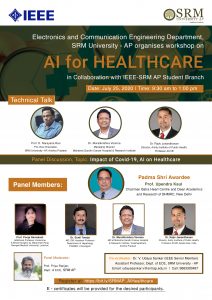 Department of Electronics and Communication Engineering, SRM University-AP, Andhra Pradesh organised an insightful workshop on “Artificial Intelligence (AI) for Healthcare” in collaboration with IEEE-SRM AP Student Branch on 25th July. Prof. D. Narayana Rao, Pro-Vice-Chancellor, inaugurated the session. The workshop was divided into two sessions.
Department of Electronics and Communication Engineering, SRM University-AP, Andhra Pradesh organised an insightful workshop on “Artificial Intelligence (AI) for Healthcare” in collaboration with IEEE-SRM AP Student Branch on 25th July. Prof. D. Narayana Rao, Pro-Vice-Chancellor, inaugurated the session. The workshop was divided into two sessions.
1. Technical presentation
2. Panel discussion
Dr Muralikrishna Voonna, Managing Director, Mahatma Gandhi Cancer Hospital & Research Institute, and Dr Rajiv Janardhanan, Director, Amity Institute of Public Health, Professor ACVB participated in the technical presentation. Dr Voona delivered a lecture on “Impact of AI in Clinical Healthcare” whereas Dr Rajiv Janardhanan spoke on “Sustainable Healthcare: AI-enabled platforms for Affordable and Accessible Healthcare Solutions”.
Eminent panellists such as Padma Shree Awardee Prof. Upendra Kaul, Dr Pooja Ramakant, Dr Sunil Taneja, Dr Muralikrishna Voonna, and Dr Rajiv Janardhanan interacted on “Impact of Covid-19, AI on Healthcare” during the second half of the session. Prof. Priya Ranjan, Department of ECE, SRM-AP, acted as the moderator of the session. Dr Udaya Shankar V, Assistant Professor, Department of ECE, was the coordinator of the workshop.
In his opening remarks, Prof. D. Narayana Rao asserted that healthcare in India faces significant challenges on quality, accessibility and affordability for a large section of the Indian population. Many healthcare experts are aware that in India, 70% of healthcare infrastructures are in the cities which caters only to 30% of India’s Population. “The shortage of doctors, lack of infrastructures, different mindset about the urban and rural population of the country and low government spending on the healthcare are very much motivating India towards innovative and sustainable and affordable technology to improve the quality of life,” said Prof Rao. He further mentioned that AI in Indian healthcare is expanding at a significant rate of 40% approximately. The AI-enabled health services such as automated analysis of medical tests, predictive healthcare diagnosis with the help of monitoring equipment and wearable sensor-based medical devices are expected to revolutionise medical treatment process in the country. AI is being extensively used in six healthcare segments such as hospital administration, pharmaceuticals, diagnostics, medical equipment and supplies, medical insurance and telemedicine. “Moreover, hospitals can implement patient-centric plans with the help of AI to avoid unnecessary hospital procedures and making healthcare services faster in India. The Government of India also shows its keen inclination as in the past week, the Hon’ble prime minister Sri Narendra Modi had a discussion with the CEO of IBM regarding the development of AI-enabled medical instruments for healthcare in the country. Needless to say, there are a plethora of opportunities for new engineers and doctors,” opined Prof Rao.
In his talk, Dr Murali Krishna Voonna confirmed that Artificial intelligence has a huge potential to become a transformational force in healthcare. It allows humans to gain unprecedented insights into diagnosis, care process, treatment variability and patient outcomes. Nowadays, machine learning uses statistical technics to give computing systems to learn with incoming data to identify patterns and make decisions which will help the doctors to assess risks, make a correct diagnosis, and offer more effective treatments. Robot-assisted surgery is now being widely popular for the precision and accuracy in performing a complicated surgery. AI is world’s one of the highest growth industries projected to reach $150 billion by 2026. It can compensate for physician biases and be used in personalised therapy by studying genome. Dr Voonna further informed that there is a huge scope for development in the segments such as brain-computer interface, next-generation radiology tools, creation of precise analytics for pathology images, expanding access to treat underserved regions, clinical decision support etc. to name a few. “Several reputed companies have invested in India to improve the AI in healthcare. NITI Aayog is working with Google to develop artificial intelligence ecosystems in India both in training and research. They have started a National Research Strategy for Artificial Intelligence recently. National Digital Health Authority has been formed as a regulatory body which is going to make the regulation in the Artificial Intelligence in start-ups and business and commercialisation of the products. Still, AI in healthcare is a decision support tool but not a decision-making tool,” explained Dr Voonna.
In the opinion of Dr Rajiv Janardhanan, the healthcare disparity continued because the investments of the government in the years after independence is less than 2 %. COVID-19 has turned out to be a blessing for health care as it made people especially policy-makers to realise that the healthcare infrastructure needs to be improved drastically. The AI-enabled intelligent support system is required because of budget constraints, rising costs of advanced medical treatments, increased complexity and cost of delivering healthcare, as well as increased expectations and demand for quality patient-centred healthcare. India comprises of a healthcare ecosystem where 80% of the healthcare is expensive, and 70% of the population is living in rural areas with marginalised and inaccessible healthcare. This makes the rationale to develop tools which are community empowering. “Knowledge dissemination of health literacy is required necessarily to increase the productive hours of the nation. When we empower the stakeholders with health literacy it directly aligns with the health promotion efforts, provides a rationale with community-empowering policy decision making, where the weakest stakeholder in the healthcare system can be an active participant,” asserted Dr Janardhanan. AI-enabled tagging of data can convert precision medicine to a community-centric new system which is called precision public health. This conversion has to be technology-enabled with support from the engineering fraternity to make it affordable and accessible.
During the second half of the session, the panel discussed the impact of COVID-19 on health immunity system. Padma Shree Awardee Prof Kaul explained in detail how COVID-19 disease affects the human body and the process of vaccination. He gave a detailed overview of how vaccines are prepared and the process of a clinical trial. He further shared the updated information on the COVID-19 vaccine with particular focus on India’s progress in making the vaccine. Dr Taneja and Dr Ramakanth expressed their views on COVID situation based on their daily experience at the hospitals. The panel agreed that the adoption of artificial intelligence (AI) in the healthcare system enables healthcare services, delivered at a lower cost with increased efficiency and emphasis on the diagnostics. AI should be encouraged to be used in machines to predict, comprehend, learn and act. It has the ability to play the role of game-changer in the areas of wellness, early detection, diagnosis, decision making, treatment, end of life, research and training. However, some concerns related to the safety, data quality, accountability, transparency, legal aspects etc. still persists.
The enthralling session ended with the vote of thanks. The insightful event certainly helped the participants to understand the approach in which AI is reinventing and improving modern healthcare through technologies that can estimate, comprehend, explore, and perform effectively.
- Published in ECE NEWS, News, Research News, Research Workshop
SRM University-AP, Andhra Pradesh: Students Creating Records Across The World
Since its inception in 2017, SRM University-AP, Andhra Pradesh has emerged as a well-recognised University in India and overseas, supported by international collaboration with reputed institutions like MIT and UC Berkeley, among others.
Semester Abroad and Accolades
In a short span of 3 years, the students have won numerous national and international accolades. Around 23 students were sponsored for a Semester Abroad Program to UC Berkeley’s Design, Innovation and Entrepreneurship program. They built start-ups, raised funding and won multiple prestigious hackathons like Hacktech @ Caltech, LAHacks, SFHacks, Developer Week Hackathon, EthDenver etc in the USA, competing with top universities like MIT and Stanford.. Further, students have gone on to win over 50 national and international hackathons, totalling over 30 lakhs in cumulative prizes in a short span of time.
SRM AP Students were also invited and hosted at the Nobel Prize Lectures 2018 in Stockholm, Sweden by Prof. Bertil Andersson, ex-Chair of the Nobel Chemistry Committee.
Several students benefitted from Semester Abroad Programs (SAP) to University of Wisconsin – Madison, and immersion programmes in Japan and Taiwan.. A batch of 30 students went to Cape Cod, MA, USA for a bootcamp on sports and visited campuses of Harvard, MIT etc.
Student Run Labs and Research
Multiple student-run labs and clubs with thousands of members and participants, including Next Tech Lab (student-led lab which won the QS Rankings and Wharton School of Business Reimagine Education award), Ennovab (Established by students returning from UC Berkeley start-up semester) to over 30 communities like PyData, ACM Student chapters etc.
On the research front, students have authored multiple research papers published in reputed journals and worked on funded research projects, with social impact. More recently, a student created an inexpensive Face-shield in response to COVID-19 , which was presented to Ministers in the AP government.
Online Research Internship and Global Placement
Students have bagged internships at NUS and NTU, Singapore; Carnegie Mellon, UC Davis, UC San Diego and other top universities in USA and multiple research labs and universities across the world, with Global Placement boarding virtual. As many as ten students in Gaming and Data Science are on the way to placed in Japan with Internship. Many are working on their internships remotely.
Campus Recruitment Drive
Campus recruitment drive has just began for the inaugural batch 2017 or Class 2021 and 12 toppers landing top – notch job offers.
Anheuser-Busch InBev offered 6 months internship, followed by a job offer to outstanding four students. Anheuser -Busch InBev SA/NV, commonly known as AB InBev is a Belgian multinational drink and brewing company. The company has offered an internship stipend of Rs 30 thousand per month and a CTC of 12-17 LPA to the candidates who will join the company after successful completion of their internship.
Another renowned company Health Rx, A health – tech start-up from Bajaj Finserv group has offered Technical Internship with a stipend of Rs 35 thousand per month, and post that a job offer with CTC of 12 LPA to two students. Further, VIRTUSA Corporation, an American IT service provider, offered a position in the company with a CTC of 4.5 LPA to 5 outstanding students. The other company which conducted the recruitment drive at SRM AP, Sahaj Soft, selected one student and offered her a CTC of 10 LPA. Sahaj Soft is a software services and consulting firm which provides simple solutions backed by their time-tested methodology and engineering practices.
As the recruiters shortlist the best young talent who are enthusiastic, devoted to learning and brimming with fresh and creative ideas, SRM AP placement team have thoroughly trained the students both in terms of technical expertise and soft skills. The rigorous training that the students underwent since the beginning of their B. Tech course, coupled with their talent and motivation, has enabled them to succeed in recruitment drive with flying colours. SRM AP believes that this is merely the beginning of the placement season, and many more brilliant students are waiting to showcase their mettle to land up with excellent job offers in top-notch companies.
On the job front, students have completed a rigorous placement preparation program, targeting international placements and are being mentored by industry experts. This week, several students got selected with a top salary of Rs 12 LPA.
Innovations and Start ups
The IDEA center established in collaboration with UC Berkeley has supported multiple student entrepreneurs and incubated their ideas, guiding them for market release.
- Published in News
a conversation with student Suchet Thapa
SRM University- AP has students coming from across multiple Indian states and countries. They come together in the same classroom and create a highly stimulating learning experience.
- Published in Student Speak
Biswas students at University of SRM
In 2018, SRM University, AP joined hands with University of California, Berkeley to
collaborate on various academic dimensions to benefit the students at campus with the new
age specilizations and entrepreneurship advancements. Establishment of IDEA (Innovation,
- Published in Student Speak
Department of Student Affairs organizes “SOP Academics Meeting”
 Department of Student Affairs, SRM University-AP, Andhra Pradesh organizes the SOP Academics Meeting for the students of SRM AP on 28th July, 2020 at 4.45 p.m. During this internal session, the speakers and participants will discuss the protocols that would ensure a beneficial future of the students amidst the pandemic.
Department of Student Affairs, SRM University-AP, Andhra Pradesh organizes the SOP Academics Meeting for the students of SRM AP on 28th July, 2020 at 4.45 p.m. During this internal session, the speakers and participants will discuss the protocols that would ensure a beneficial future of the students amidst the pandemic.
Registration Link: Please Click Here
Department of Student Affairs organises a session on the “Introduction to Mindfulness”
 COVID-19 pandemic, the incessant lockdown and the aftereffects are now hugely affecting people emotionally. Nowadays, many are suffering from fear related to the disease and chronic depression among other ailments. It is high time to apply some scientific methods to keep our minds calm and composed. Department of Student Affairs is organising a session of “Introduction to Mindfulness” on July 30, 2020, at 4 p.m. Dr Salome Divya Joseph is an Assistant Professor at the Department of Psychology. She will be speaking on the importance and methods of the mindfulness during the session.
COVID-19 pandemic, the incessant lockdown and the aftereffects are now hugely affecting people emotionally. Nowadays, many are suffering from fear related to the disease and chronic depression among other ailments. It is high time to apply some scientific methods to keep our minds calm and composed. Department of Student Affairs is organising a session of “Introduction to Mindfulness” on July 30, 2020, at 4 p.m. Dr Salome Divya Joseph is an Assistant Professor at the Department of Psychology. She will be speaking on the importance and methods of the mindfulness during the session.
- Published in Events


